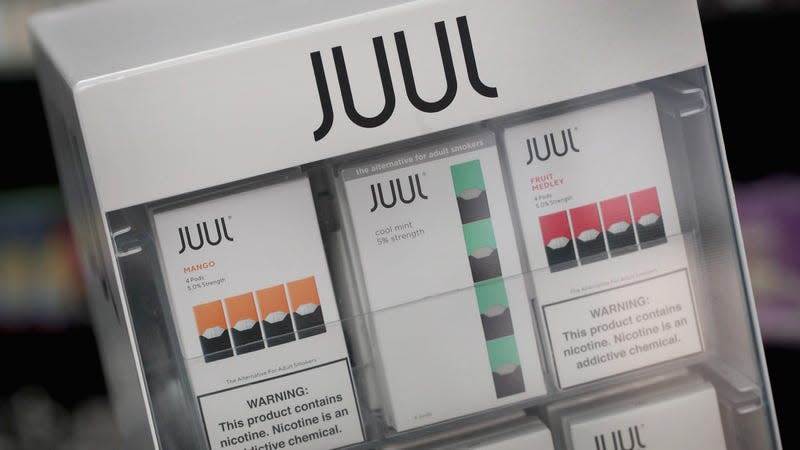Juul's Latest Cash Injection Staves Off Bankruptcy, for Now

Juul, the vape industry giant that found itself a puff away from business death earlier this year, has managed to secure enough financing to avoid bankruptcy. Its temporary survival, however, will cost the company nearly a third of its workforce.
The bailout, first reported on by The Wall Street Journal, reportedly came from two of Juul’s earliest investors, Hyatt Hotels heir Nick Pritzker and California based investor Riaz Valani. That pair of moneymen were reportedly Juul’s two largest investors aside from tobacco giant Altria, which purchased a $12.8 billion stake in Juul back in 2018.
Read more
The still unknown amount of additional funds will help Juul limp forward, but it’s unclear for how long. Juul, which agreed to pay out nearly $440 million to settle a massive marketing lawsuit, still potentially faces hundreds of millions of dollars in damages from additional suits. With those worries in mind, Juul says it will eliminate 400 jobs— around 30% of its employees—in a massive company-wide cost cutting initiative. Sources speaking with Bloomberg claim the layoffs are part of a wider company wide effort at Juul to cut the company’s overall operating budget by 30-40%.
A Juul spokesperson confirmed The Journal’s reporting in an email sent to Gizmodo.
“Today, Juul Labs has identified a path forward, enabled by an investment of capital from some of our earliest investors,” the spokesperson said. “This investment will allow Juul Labs to maintain business operations, continue advancing its administrative appeal of the FDA’s marketing denial order and support product innovation and science generation.”
The spokesperson described the massive layoffs as a, “difficult but necessary step.”
The cash injection represents the first bit of good news for Juul which has spent most of 2022 struggling for survival. In June, following years of lawsuits and complaints accusing the company of promoting youth vaping, the Food and Drug Administration moved to ban sales of the Juul device and its accompanying nicotine pods. Juul appealed the FDA’s decision, claiming the agency singled out their product among a crowded field of competitors selling basically the same thing.
Surprisingly, Juul won out. In July, the FDA walked back its ban and announced its decision to stay its marketing ban due to, “numerous scientific issues unique to the JUUL application that warrant additional review.” Still, Juul’s long term future in relation to the FDA remains shrouded in smoke.
Juul will need all of the money it can muster, both to continue pursuing its dispute with the FDA and to fend off a dizzying array of potentially business-ending lawsuits. In September, the company spent $439 million to settle a two-year-old investigation into the company’s marketing practice spearheaded by 33 states and Puerto Rico. As part of the settlement, Juul agreed to cease marketing to individuals under the age of 35, refrain from advertising on public transportation, no longer recruit influencers to help push its products, and discontinue funding of so-called education programs. Juul, ABC News notes, still faces nine additional lawsuits from states in addition to hundreds of personal lawsuits from minors who claim they got hooked on vaping because of Juul.
More from Gizmodo
The Best Shortcuts On Mac: Snap Windows, Text to Speech, and More
How to Delete Your Twitter Account If Elon Musk Was Your Last Straw
Sign up for Gizmodo's Newsletter. For the latest news, Facebook, Twitter and Instagram.

